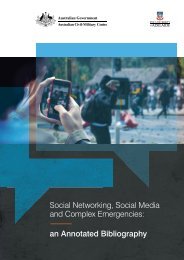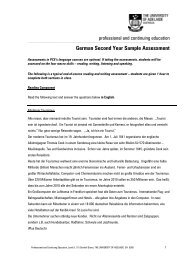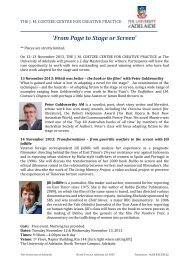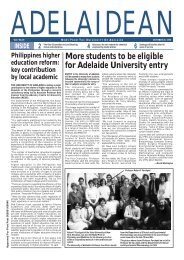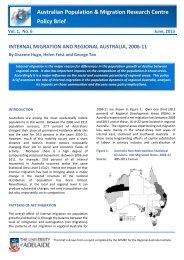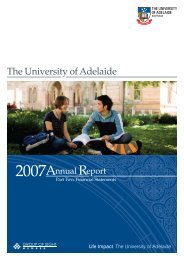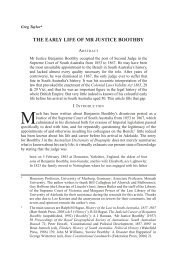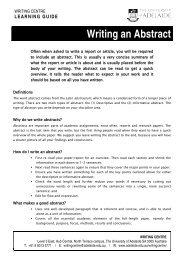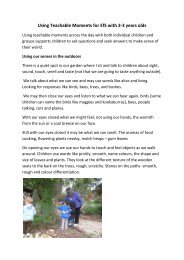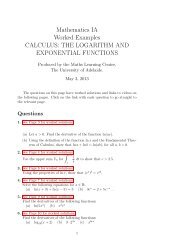Unbridling the Tongues of Women - The University of Adelaide
Unbridling the Tongues of Women - The University of Adelaide
Unbridling the Tongues of Women - The University of Adelaide
Create successful ePaper yourself
Turn your PDF publications into a flip-book with our unique Google optimized e-Paper software.
Introduction<br />
South Australian Company. <strong>The</strong> eldest, Lucy, married, had five children and, in<br />
1861, died; <strong>the</strong> five children, three <strong>of</strong> whom were quite young, were apparently left<br />
almost friendless. Spence had gone to nurse Lucy on her deathbed, and took upon<br />
herself <strong>the</strong> task <strong>of</strong> finding help for <strong>the</strong> young Duvals, a function she performed<br />
intermittently for <strong>the</strong> rest <strong>of</strong> her life. Letters from an uncle in England constituted<br />
her <strong>the</strong>ir guardian, and, at least initially undertook to remit £100 a year for <strong>the</strong>ir<br />
support. One <strong>of</strong> <strong>the</strong>se children, Rose, returned to Miss Spence for help, about two<br />
decades later, when she was herself a mo<strong>the</strong>r <strong>of</strong> three small children. She had been<br />
widowed, and needed someone to care for <strong>the</strong> children when she took a job as a clerk<br />
in a government department, so she moved to a house near Spence’s. Later, she and<br />
<strong>the</strong> children lived for a time with Spence and Ellen Gregory in <strong>the</strong> ‘little community’<br />
in East <strong>Adelaide</strong>. And when Rose died, Spence took her young daughter, Kitty, to<br />
live with her, a move which ended tragically in 1904 when Kitty cut her throat in<br />
<strong>the</strong> bath and died. 66<br />
At <strong>the</strong> same time as she made friends with Lucy Beare, Spence also made friends<br />
with <strong>the</strong> Stirlings, <strong>the</strong> Bakewells, and <strong>the</strong> Taylors – all families with substantial pastoral<br />
and mercantile interests in <strong>the</strong> colony – <strong>the</strong> first two with numerous children in<br />
whom Spence took, she said, much interest. In one household she was ‘Miss Spence<br />
<strong>the</strong> storyteller’, in <strong>the</strong> o<strong>the</strong>r ‘Miss Spence, <strong>the</strong> teller <strong>of</strong> tales.’ 67 Those families found<br />
ways <strong>of</strong> <strong>of</strong>fering Miss Spence material evidence <strong>of</strong> <strong>the</strong>ir esteem for her. <strong>The</strong> Stirlings<br />
gave her a fare to England and back in 1865, and <strong>the</strong> Bakewells took her to stay with<br />
<strong>the</strong>m when she first arrived in London. John Taylor provided her with <strong>the</strong> £200<br />
spending money that she took with her on that trip. He was <strong>the</strong> model for Charles<br />
Reginald, <strong>the</strong> hero <strong>of</strong> her first novel, and he had taken that novel to England for her<br />
in search <strong>of</strong> a publisher in 1853. 68<br />
Emily Clark sought an introduction to Spence to congratulate her on her novel;<br />
introduced her to <strong>the</strong> Unitarian congregation in <strong>Adelaide</strong>; gave her letters <strong>of</strong> introduction<br />
to friends and relatives in England; and drew her into 30 years’ work on <strong>the</strong><br />
welfare <strong>of</strong> destitute children. 69 Edith Cook shared her opinion about <strong>the</strong> necessity <strong>of</strong><br />
secondary education for girls, and as headmistress <strong>of</strong> <strong>the</strong> Advanced School for Girls,<br />
<strong>of</strong>ten invited Miss Spence to give lessons to her students. 70 John Anderson Hartley,<br />
Inspector-General <strong>of</strong> Education in South Australia from 1878 until 1895, became a<br />
good friend when Spence <strong>of</strong>fered to help with his work; he supported her campaigns<br />
for electoral reform. 71 Alfred Cridge, <strong>the</strong> American who commented on her dress,<br />
with whom she said she felt as at home as with her bro<strong>the</strong>r David, was an ardent sup-<br />
19



